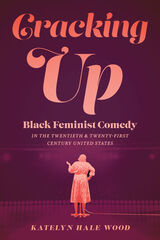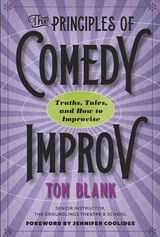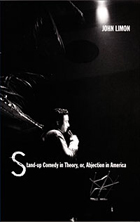3 books about Stand-up comedy

Cracking Up
Black Feminist Comedy in the Twentieth and Twenty-First Century United States
Katelyn Hale Wood
University of Iowa Press, 2021
Cracking Up archives and analyzes Black feminist stand-up comedy in the United States over the past sixty years. Looking closely at the work of Jackie “Moms” Mabley, Mo’Nique, Wanda Sykes, Sasheer Zamata, Sam Jay, Phoebe Robinson, Jessica Williams, Amanda Seales, and Michelle Buteau, this book shows how Black feminist comedy and the laughter it ignites are vital components of feminist, queer, and anti-racist protest.
Katelyn Hale Wood interprets these artists not as tokens in a white, male-dominated field, but as part of a continuous history of Black feminist performance and presence. Broadly, Cracking Up frames stand-up comedy as an important platform from which to examine citizenship in the United States, articulate Black feminist political thought, and subvert structures of power. Wood also champions comedic performance and theatre history as imperative contexts for advancing historical studies of race, gender, and sexuality. From the comedy routines popular on Black vaudeville circuits to stand-up on contemporary social media platforms, Cracking Up excavates an overlooked history of Black women who have made the art of joke-telling a key part of radical performance and political engagement.
Katelyn Hale Wood interprets these artists not as tokens in a white, male-dominated field, but as part of a continuous history of Black feminist performance and presence. Broadly, Cracking Up frames stand-up comedy as an important platform from which to examine citizenship in the United States, articulate Black feminist political thought, and subvert structures of power. Wood also champions comedic performance and theatre history as imperative contexts for advancing historical studies of race, gender, and sexuality. From the comedy routines popular on Black vaudeville circuits to stand-up on contemporary social media platforms, Cracking Up excavates an overlooked history of Black women who have made the art of joke-telling a key part of radical performance and political engagement.
[more]

The Principles of Comedy Improv
Truths, Tales, and How to Improvise
Tom Blank
University of Iowa Press, 2023
The Principles of Comedy Improv is an authoritative handbook for beginners and experts alike. More than just entertainment, improv’s tenets enable you to change every moment of your life. Your guide is Tom Blank, who crystallizes two decades of experience to convey improv in unparalleled scope, depth, and fun.
[more]

Stand-up Comedy in Theory, or, Abjection in America
John Limon
Duke University Press, 2000
Stand-Up Comedy in Theory, or, Abjection in America is the first study of stand-up comedy as a form of art. John Limon appreciates and analyzes the specific practice of stand-up itself, moving beyond theories of the joke, of the comic, and of comedy in general to read stand-up through the lens of literary and cultural theory. Limon argues that stand-up is an artform best defined by its fascination with the abject, Julia Kristeva’s term for those aspects of oneself that are obnoxious to one’s sense of identity but that are nevertheless—like blood, feces, or urine—impossible to jettison once and for all. All of a comedian’s life, Limon asserts, is abject in this sense.
Limon begins with stand-up comics in the 1950s and 1960s—Lenny Bruce, Carl Reiner, Mel Brooks, Mike Nichols, Elaine May—when the norm of the profession was the Jewish, male, heterosexual comedian. He then moves toward the present with analyses of David Letterman, Richard Pryor, Ellen DeGeneres, and Paula Poundstone. Limon incorporates feminist, race, and queer theories to argue that the “comedification” of America—stand-up comedy’s escape from its narrow origins—involves the repossession by black, female, queer, and Protestant comedians of what was black, female, queer, yet suburbanizing in Jewish, male, heterosexual comedy. Limon’s formal definition of stand-up as abject art thus hinges on his claim that the great American comedians of the 1950s and 1960s located their comedy at the place (which would have been conceived in 1960 as a location between New York City or Chicago and their suburbs) where body is thrown off for the mind and materiality is thrown off for abstraction—at the place, that is, where American abjection has always found its home.
Limon begins with stand-up comics in the 1950s and 1960s—Lenny Bruce, Carl Reiner, Mel Brooks, Mike Nichols, Elaine May—when the norm of the profession was the Jewish, male, heterosexual comedian. He then moves toward the present with analyses of David Letterman, Richard Pryor, Ellen DeGeneres, and Paula Poundstone. Limon incorporates feminist, race, and queer theories to argue that the “comedification” of America—stand-up comedy’s escape from its narrow origins—involves the repossession by black, female, queer, and Protestant comedians of what was black, female, queer, yet suburbanizing in Jewish, male, heterosexual comedy. Limon’s formal definition of stand-up as abject art thus hinges on his claim that the great American comedians of the 1950s and 1960s located their comedy at the place (which would have been conceived in 1960 as a location between New York City or Chicago and their suburbs) where body is thrown off for the mind and materiality is thrown off for abstraction—at the place, that is, where American abjection has always found its home.
[more]
READERS
Browse our collection.
PUBLISHERS
See BiblioVault's publisher services.
STUDENT SERVICES
Files for college accessibility offices.
UChicago Accessibility Resources
home | accessibility | search | about | contact us
BiblioVault ® 2001 - 2024
The University of Chicago Press









